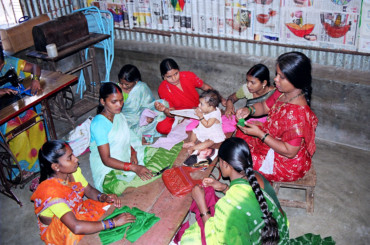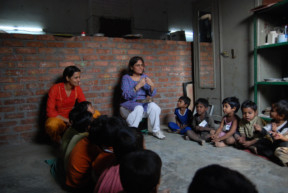
The gleaming edifices of Gurgaon, Goregoan, New Town Kolkata or downtown Bengaluru has every Indian brimming with pride, and had Jawaharlal Nehru been alive, he would have certainly described them as “Temples of Modern India in the 21st century”. They certainly are, as they provide millions of Indians a chance to live life the same way had they been anywhere else in the world. However, as they say, the darkest place is under the lamp.
It was a lazy afternoon in Mumbai, and I happened to walk into what appeared to be just another construction site, promising many amenities for the well heeled. In its parking lot were people we tend to ignore, or have taken for granted: the migrant labourers and their children who build these edifices for you and me! But it took me a while to realise that I had chanced upon the work of the Mumbai Mobile Crèches (MMC), which provides safe and healthy living conditions for the children within the construction sites while their mothers toil all day to earn a living. “Mumbai Mobile Crèches was started way back in 1969 in Delhi and later in Mumbai in 1972 by our founder-chairman Meera Mahadevan,” says Devika Mahadevan, chief executive of MMC.
“Our vision is for all children to have a happy childhood and our mission is to promote ‘child-friendly sites’, where every child living on a construction site is safe, healthy and educated, and able to enjoy their childhood. For us, ensuring that the first few years of a child’s life are well-nourished and stimulating is essential for a happy childhood, and we have a special focus on children below 6,” Mahadevan says.
As the story goes, Meera saw an orphaned child, lying unattended and exposed to the harsh heat playing with rubble, under a statue of Mahatma Gandhi — the father of independent India — and soon MMC was born. In its three decades of operation it has run 500 mobile crèches, in Mumbai, Delhi and Pune and has reached out to more than 650,000 children so far.
“Since then, MMC has developed a comprehensive day-care service programme that meets children’s emotional, physical, cognitive and social development needs, and has pioneered the first Early Child Care Education (ECCE) programme for migrant workers’ children. In April 2007, Mobile Crèches split into three separate entities — Mobile Crèches (Delhi), Mumbai Mobile Crèches and Tara Mobile Crèches (Pune). This move has been to ensure administrative simplicity, and the commitment and focus continues unchanged,” Mahadevan adds.
The construction industry is the single largest employer of migrant labourers in Indian cities. Approximately 35 million men and women work in this sector and they are largely unorganised. Moving to wherever they can earn an income, their lives are characterised by insecurity of wages, dangerous working conditions, and a lack of access to any kind of welfare. The children of these workers — estimated to be more than 50 million — are even more vulnerable. “Because their families are extremely poor and also since their parents are constantly working, mothers sometimes go back to work within days after delivery, leaving the newborn at the care of slightly older siblings,” says a concerned Anita Veeramani, research and communications officer, MMC. “They suffer from malnutrition, undernourishment, accidents and innumerable health problems. They have limited access to formal schooling, day-care centres or any sort of support system. The dangerous construction site is their only playground.”
The crèches that MMC operate are within the construction sites, generally in the parking lot, or a partially completed section of the building. Here, children up to 6 years are left by their labourer mothers in the morning. The centre is generally divided into three sections: the crèche, the balwadi and the NFE. At the crèche you will see a few swings for the children and they are provided with cereal and milk mixture; at the balwadi, children learn basic skills. These children are provided meals six days a week, twice a day. At the NFE, the older students are introduced to elementary education so that they can be admitted to a corporation school nearby. MMC also has volunteers from different centres to take care of the medical, entertainment and educational needs of the children. For their entertainment, they organise street theatre, puppet shows and even take them to picnics in and around the city. Though every centre is different mostly due to the number of children they cater to, all have a kitchen, bathroom, electricity and clean water, Mahadevan says.
“If a child is a father of a man, then MMC is certainly building the future of millions of children for decades to come,” said Satish Rai, a sociologist. Saving one child from abject poverty actually means saving at least five people from sub-human conditions, he added. MMC has many success stories, and one of their students is now a merchant navy officer, criss-crossing the globe. Others may not be as lucky but certainly don’t follow the path of their parents.
“Many of them are electricians and carpenters, and some now work for us as teachers or co-coordinators in our crèches,” Veeramani says. MMC today has branches in Delhi, Mumbai and Pune known as Tara Mobile Crèches, but they share the same focus and are controlled by the same board.
MMC is a founding partner in the Forum for Crèches and Childcare Services (FORCES), a national network, and participates in its Maharashtra chapter. Its seeks to champion the cause of vulnerable children in the construction sites, and work towards a situation where early childhood education and care is included in the education policy and recognised not just as the mother’s duty but the entire family’s and state’s. MMC is also a member of the Coordination Committee for Vulnerable Children, which networks with 40 Mumbai-based NGOs working on child rights. The organisation is also involved in city-wide campaigns and coalitions with NGO partners on issues of child labour, education and health to especially ensure that construction workers’ children’s issues are heard. Finally, the organisation links up with the Maharashtra Chamber of Housing Industries and the Builders’ Association to advocate for children’s rights on construction sites.
“We do get some grants from the Maharashtra state government for our work. Other than that, we are entirely dependent on the grants from well-wishers,” Mahadevan says. “But we appreciate the gesture of the builders, who have always supported us in our work, not only by providing space, but also some additional help. One of the primary concerns of MMC is to reach out to as many as children as possible as and for that it certainly seeks your support. I may sound more like a financial planner selling products, but if you reach out, you will certainly invest in the human infrastructure of India, the soft power that we boast of, the scripts of which are not available with your agent, but certainly with this organisation.”
Archisman Dinda is a journalist based in Kolkata.
Box
If you want to volunteer
The organisation requires volunteers who can raise funds to sponsor events, equipment and technical guidance. Other volunteers can spend time at the crèches and help teach and play with the children or cook for them. “Anyone is welcome to volunteer as long as they are dedicated. We need people who can take an initiative and add to our efforts. They need to spend a consistent amount of time with us,” says Neeta Khajuria, general manager of Mumbai Mobile Crèches.
Toys, books, stationery and clothes for babies can be donated at http://www.mumbaimobilecreches.org/home.htm
Rs5,000 (Dh338) for this charity can
Support comprehensive development — health, education and nutrition expenses — for 10 children a month
Support nutrition expenses for five children for a year
Support one “balwadi” teacher for a month
Rs25,000 can support a child development centre for a month



